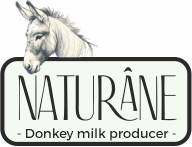No products
Prices are tax included
Product successfully added to your shopping cart
There are 0 items in your cart. There is 1 item in your cart.
The exploitation of donkey milk was usual among ancient people. The Greeks considered donkey milk as an excellent cure, the Romans made it a luxury drink. Hippocrates recommended it for all sorts of ills: poisoning and envenomation, joint pain, wound healing ...
The donkey has a milk whose composition is the closest to that of human milk. It can also be based on historical observations: since the nineteenth, the donkeys have been used to distribute milk in cities and maternity hospitals. Why aren’t these donkeys wich only produce up to 500 ml per day replaced by heavy mares wich produce 2 liters? It was already noticed that the milk of donkey was better suited to man.
VIRTUES OF DONKEY MILK
GREAT DIGESTIBILITY
Donkey milk is easy to digest, simply because it contains less proteins than cow's milk. The donkey products milk which contains no coagulated casein: it flocculates under the action of gastric chyme acids (it quails into fine flakes). Digestion is easy because it also contains a low fat content. In addition, the donkey's milk is rich in lysozyme, an anti-bacterial enzyme that promotes the hydrolysis of milk lipids.
HIGH NUTRITION
Donkeys are monogastric and the milk composition in fatty acids is exactly that of the diet. It is an ideal dietary profile, 40% saturated fat, 30% monounsaturated and 30% polyunsaturated (EFAs). Cow's milk contains mostly saturated fatty acids. The presence of whey proteins in greater quantities than that of cow's milk gives an important nutritional interest to donkey milk: these proteins contain essential amino acids.
USE IN PREGNANCY
In breast milk, fats consist mainly of polyunsaturated fatty acids. Cow's milk, mainly contains saturated fatty acids with large lipid molecules that the human liver has difficulty to digest and metabolize. The biliary system is tired because of its to dissolve a product incompatible with the human digestive system. Therefore the very vulnerable infants (orphaned or whose mother has no milk) should not weaken the body by digesting cow's milk.
Infants often have allergies to cow's milk, due to the presence of a protein. This is the allergenic protein beta-lactoglobulin (absent in breast milk). It is less abundant and is in a simpler form in the equine milk than in cow. Donkey milk is recognized to be necessary to feed the babies allergic to cow's milk protein. Besides feeding infusion, only that milk provides a disappearance of all symptoms (diarrhea, vomiting, blood in the stool) in 24 hours.
Today, it is based on historical facts, mentioned since antiquity, on testimonies and some analyzes of these milks. Herodotus, the great Greek historian, summarized his purpose with the formula: "nutrit, roborat, altérat", that means "it nourishes, strengthens and stimulates"
ANTIBIOTIC EFFECT
The antibiotic effect of donkey milk leads to an improvement of the condition of people with some diseases. Donkey milk is rich in alpha-lactalbumin, lactoferrin and lysozyme. These three major soluble proteins are antimicrobial. As they are composed of a few amino acids able to cross the intestinal barrier, they have an immunostimulatory effect on the body.
THE DIGESTIVE SYSTEM
Donkey milk affects all the intestinal transit problems, both for children and adults.
A poor diet disrupts the intestinal flora and often causes diarrhea, constipation, and other problems. Donkey milk due to its high content of lysozyme destroys pathogenic bacteria in the gut. Premature or sick infants should not drink cow's milk: in addition to its very different composition from human milk, this milk binds the toxins. This can only worsen the case of a sick child. Unlike cow's milk, donkey milk contains immunoglobulins which play a role in the fight against infections and regenerate the intestinal flora (especially for the infant who has not established its intestinal immune barrier yet).
SKIN
The great quantity of essential fatty acids, and with vitamin A of donkey milk helps to maintain physiological functions such as skin and mucosal healing (ulcers). There are many testimonies of acne, eczema and psoriasis healing. It provides deep hydration and very long lasting.
LIVER
Donkey milk relieves the liver while providing essential nutrients. Donkey milk, rich in alpha-lactalbumin contains a lot of cystine, an amino acid that acts on the liver, promoting detoxification. In Germany, clinics offer donkey milk in rehab for alcoholics. Several documents explain that the Koumis (fermented milk) is used in sanatoriums as a treatment for the treatment of hepatitis.
NERVOUS SYSTEM
Donkey milk contains beta casein which has a soothing activity on the nervous system. Today we know the role of essential fatty acids (found in large quantities in donkey milk) on the nervous system; they participate in the formation of the brain and nerve cells as a food energy. Thus, the Koumis has a beneficial effect on the nervous system. In Russia, it is prescribed alone or with other treatments. It is also prescribed for stress, depression, during exams ...
AGAINST DISEASES AND DEFICIENCIES
Already in ancient times, nomadic people who had a lack of vitamin-rich foods such as raw vegetables, used donkey milk as vitamin intake.
